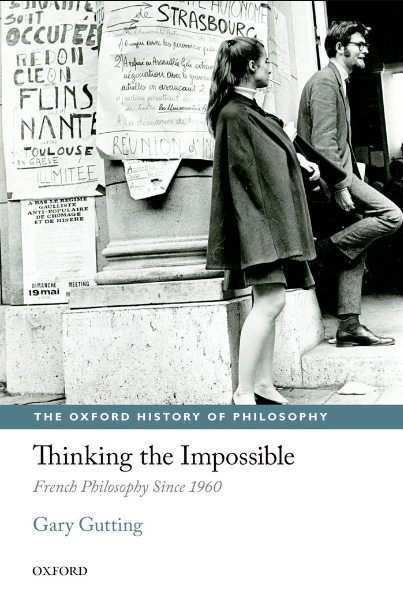Newly released
This book is new and will be uploaded as soon as it becomes available to us and if we secure the necessary publishing rights.

Thinking the Impossible: French Philosophy Since 1960 Book PDF
(0)
Author:
Gary GuttingNumber Of Reads:
70
Language:
English
Category:
Social sciencesSection:
Pages:
225
Quality:
excellent
Views:
980
Quate
Review
Save
Share
New
Book Description
The late 20th century saw a remarkable flourishing of philosophy in France. The work of French philosophers is wide ranging, historically informed, often reaching out beyond the boundaries of philosophy; they are public intellectuals, taken seriously as contributors to debates outside the academy. Gary Gutting tells the story of the development of a distinctively French philosophy in the last four decades of the 20th century. His aim is to arrive at an account of what it was to "do philosophy" in France, what this sort of philosophizing was able to achieve, and how it differs from the analytic philosophy dominant in Anglophone countries.
His initial focus is on the three most important philosophers who came to prominence in the 1960s: Michel Foucault, Gilles Deleuze, and Jacques Derrida. He sets out the educational and cultural context of their work, as a basis for a detailed treatment of how they formulated and began to carry out their philosophical projects in the 1960s and 1970s. He gives a fresh assessment of their responses to the key influences of Hegel and Heidegger, and the fraught relationship of the new generation to their father-figure Sartre. He concludes that Foucault, Derrida, and Deleuze can all be seen as developing their fundamental philosophical stances out of distinctive readings of Nietzsche. The second part of the book considers topics and philosophers that became prominent in the 1980s and 1990s, such as the revival of ethics in Levinas, Derrida, and Foucault, the return to phenomenology and its use to revive religious experience as a philosophical topic, and Alain Badiou's new ontology of the event. Finally Gutting brings to the fore the meta-philosophical theme of the book, that French philosophy since the 1960s has been primarily concerned with thinking the impossible.
Gary Gutting
Gary Gutting is a distinguished academic philosopher and a major contributor to public discussions of philosophical questions.
He has taught for many years at the University of Notre Dame, where he holds the John A. O'Brien Chair in Philosophy. He is the author of seven academic books and editor of five others, and has published over forty articles. His main areas of research are philosophy of science, philosophy of religion, and twentieth-century French philosophy.
For a wider audience, he is the author of Foucault: A Very Short Introduction, a volume that has been translated into 7 languages.
Since June, 2011, he has been a regular contributor to the New York Times philosophy blog, The Stone, publishing over 100 columns and interviews. Other work for the Times includes analyses of the 2012 Presidential Debates for "Campaign Stops" and essays in the Sunday Review. His recent book, What Philosophy Can Do, contains essays on politics, science, religion, education, and art that expand on his Stone columns.
He has been interviewed on a number of radio and television broadcasts, including National Public Radio's "All Things Considered" (with Richard Harris on climate policy), Canadian Broadcasting Television's "Lang & O'Leary Exchange" (gun control), Sirius Radio's "StandUp with Peter Dominick" (gun control), Cyberstation USA (religion and politics), and Al-Jazeera English TV (with Bob Reynolds on extraterrestrial life).
Read More
Book Currently Unavailable
This book is currently unavailable for publication. We obtained it under a Creative Commons license, but the author or publisher has not granted permission to publish it.
Rate Now
5 Stars
4 Stars
3 Stars
2 Stars
1 Stars
Thinking the Impossible: French Philosophy Since 1960 Quotes
Top Rated
Latest
Quate
Be the first to leave a quote and earn 10 points
instead of 3
Comments
Be the first to leave a comment and earn 5 points
instead of 3